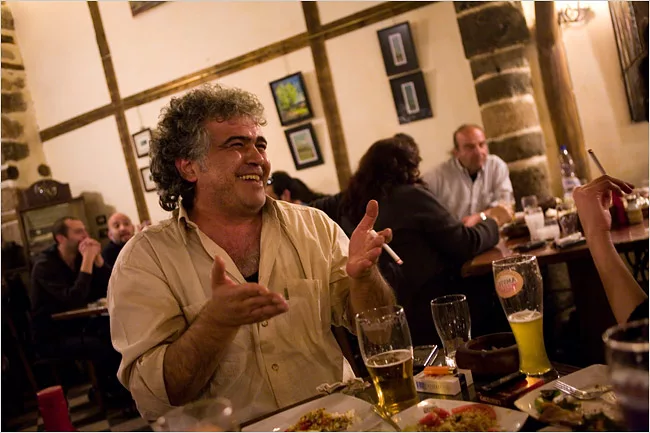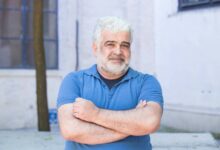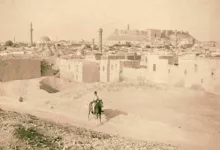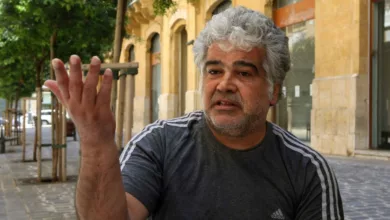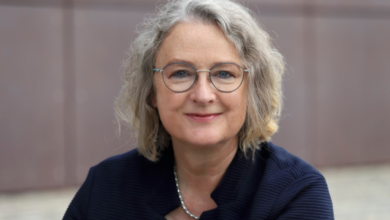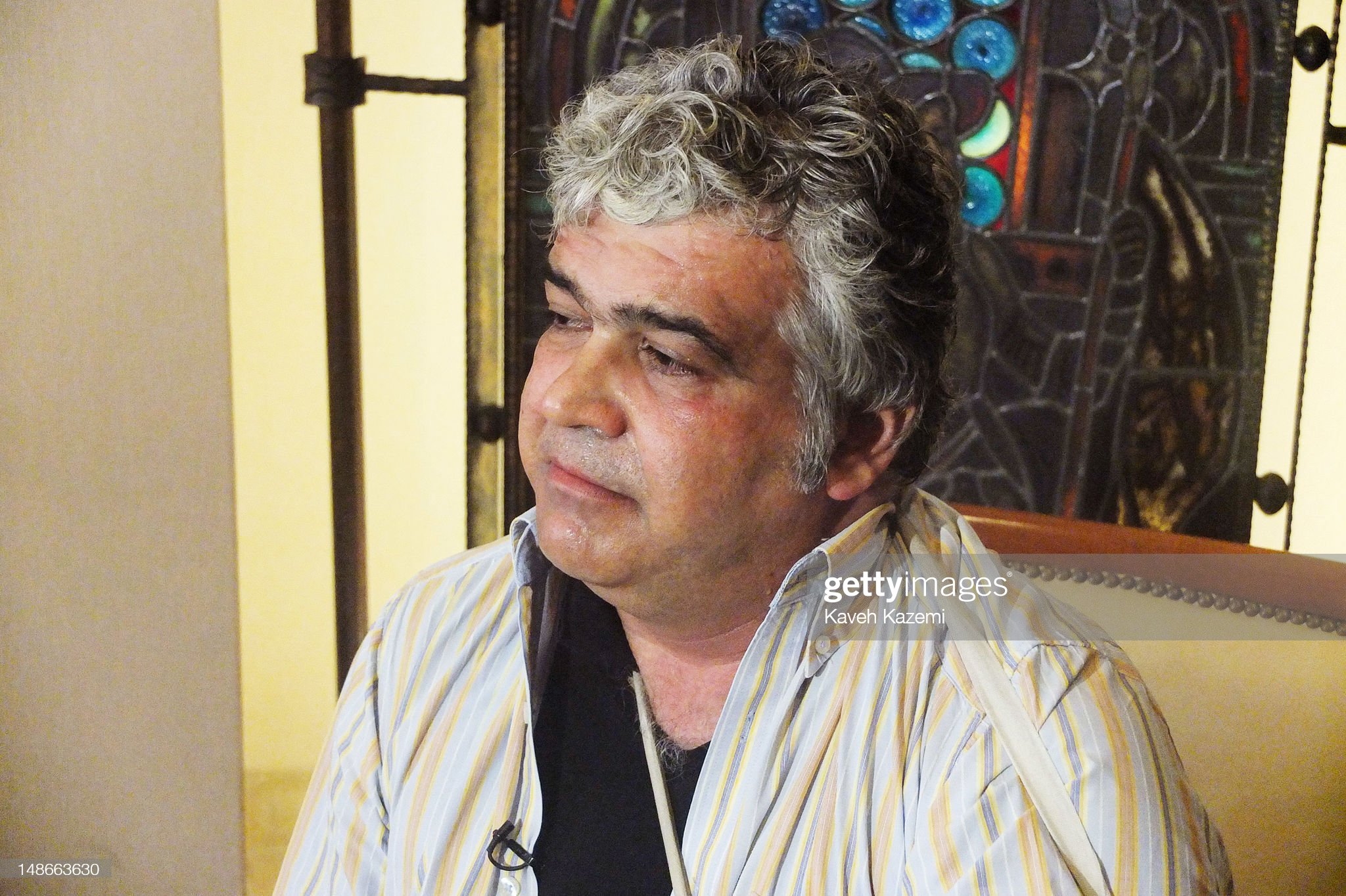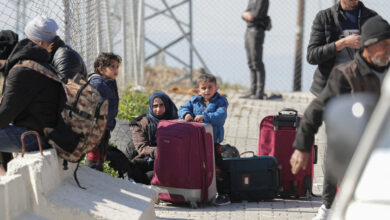PEOPLE still talk about what happened here in the 1980s as “the Events,” as if they were too awful to describe. The Syrian military’s bloody struggle with militant Islamists left at least 10,000 dead in the city of Hama, and produced a trauma the authorities do not like to hear discussed.
So when Khaled Khalifa decided to write about it in his latest novel, “In Praise of Hatred,” he knew he was touching a taboo subject. The book, a Balzacian tale full of romance and murder that ranges from Afghanistan to Yemen to Syria, was promptly banned when it was first published here in 2006.
Last month, the novel, republished in Beirut in 2007, became a finalist for the International Prize for Arabic Fiction, a new award modeled on Britain’s Man Booker Prize. It is now being translated into English and other languages.
All that has given Mr. Khalifa, who is better known here for his television screenplays, a new prominence as one of the rising stars of Arab fiction, and a rare public voice on a largely forbidden topic.
“If I had won the Booker, the regime would have had a huge problem,” he said with a barrel-chested laugh. “I think the culture minister breathed a big sigh when I lost.” (The top prize went to an Egyptian novelist, Bahaa Taher, the éminence grise of Arab letters.)
A bearish man with a boiling corona of steel-gray hair, Mr. Khalifa, 44, has a clownish humor that undercuts his large literary ambitions. He smoked, drank and plowed through a table full of appetizers during a late-night interview at Ninar, a Damascus restaurant popular with Syrian artists and intellectuals, his long answers interrupted by bursts of raucous laughter.
THE novel, he said, took him 13 years to write, and draws on his early years growing up in Aleppo. There he watched the conflict between the Islamists and the security forces of Syria’s secular Baath Party become steadily more violent, with what he calls a “culture of elimination” developing on both sides.
“The main thing I wanted to get at was the struggle of two fundamentalisms,” he said. “I remember that heaviness, that feeling of death dominating the whole city. You were always surrounded by armed men who agreed on only one thing: If you’re not with us, you’re against us.”
Although the novel is centered on a single Aleppo family, it encompasses the broader global story of political Islam over the past three decades. Some real people make appearances, including Abdullah Azzam, a leader of the Afghan jihad against the Soviet Union and a mentor of Osama bin Laden.
But Mr. Khalifa insists he has no interest in social realism or didactic fiction. Political ideology infected the work of too many Arab writers in the 1960s and ’70s, he said. His own aims are purely aesthetic, and his heroes are William Faulkner and Gabriel García Márquez. He chose to write about “the Events” not to make a political point, but to give artistic life to the increasingly brutal realities of the world he grew up in.
“In Praise of Hatred” is narrated by a young woman, and its title comes from an observation she makes about the way hatred filters from the violent streets outside into her own quiet life: “Hatred possessed me. I was excited by it, I felt it was saving me; it gave me a sense of superiority I had been seeking for a long time.”
Mr. Khalifa said he knew the book was crossing what are universally called “red lines” in the Arab world, and he was frightened when it came time to publish.
Banning books is normal for us here, it’s funny, even a little absurd. It’s not like Europe ‘Ooh, I’ve been censored’
KHALED KHALIFA
Not for the first time, he added. His second novel, “The Gypsy Notebooks,” includes material about Syria’s Baath Party. It was banned for four years, not by the government, but by the Union of Arab Writers, which “tries to be more royal than the king,” he said, with a disparaging chuckle.
The subject of censorship provokes an irreverent outburst from Mr. Khalifa.
“Banning books is normal for us here, it’s funny, even a little absurd,” he said with an impish smile. “It’s not like Europe ‘Ooh, I’ve been censored!’ ” He fluttered his hands in mock anxiety. A book is not better just because it has been banned, he said. And Western talk of censorship seems to strike him as a little moralistic.
“Here, we know people in the censorship office,” he went on, laughing, in phrases studded with profanity. “So you might call them: ‘Why the hell did you censor my book?’ And he’ll respond, ‘Why the hell did you have to write about this?’ ”
In fact, Mr. Khalifa hints that he has made some compromises. (“We don’t want to live outside Syria, and we know how to avoid this.”) The Alawites, for instance, the religious minority to which the ruling Assad family belongs, are described in his latest novel as the “mountain people,” and a military leader who resembles the feared brother of former President Hafez al-Assad is left unnamed.
The book also scarcely mentions Hama, the city where the deadliest battle between the Syrian military and the Islamists took place, in 1982. Instead, it is set largely in Aleppo, which had its own share of violence during those years.
“For me, Aleppo was the main struggle, because the violence there happened over a long period of time, not overnight, like in Hama,” he said.
Literary celebrity is new to Mr. Khalifa. He spent much of his 20s living in his middle-class family’s home in Aleppo, a miserable time during which he wrote fiction from midnight to 6 a.m., when the house was quiet. His mother gave him the equivalent of a few dollars for cigarettes and coffee every day. His first novel, “The Guard of Deception,” was not published until 1993, when he was almost 30.
Four years later his first television screenplay was broadcast, and he moved to Damascus and got an apartment of his own. He started doing television work as a way to make money (“I needed a way to pay for alcohol”), but he is now one of the writers who have helped Syrian TV serials rival Egyptian shows in their popularity across the Arab world.
HE tries to focus on fiction now, writing all afternoon at home or at the Journalists’ Club, a local hangout. He is a well-known figure in the Damascus art scene; he got up several times during the interview to greet fellow writers or actors with hugs and kisses on the cheek as they arrived at Ninar. His cellphone buzzed, and once recognizing the number he answered it in Arabic with a familiar “What’s up, jerk?”
He is not married (“I have been lucky,” he said) and when he commented on the beauty of a woman passing the table, a translator tut-tutted him, drawing a big Falstaffian grin in response.
But the frivolity dropped when Mr. Khalifa returned to the subject of his novel.
“Syria has a long history as a cosmopolitan and commercial place; its traditions are tolerant and diverse,” he said. “This is what prevented the victory of the Islamists in the 1980s.”
The violence of that period eroded those traditions, he said, tincturing the whole society with intolerance and brutality. “We haven’t had a setback like this in 1,000 years,” he added. And though the Muslim Brotherhood, the group that led the armed rebellion in the 80s, is banned, Islamic fundamentalism “has grown and penetrated our society, especially among the young.”
“All this has harmed Syrian society so much,” he said sadly. “If what happened in the 1980s were to happen again, I think the Islamists would win.”
Published on New York Times here.

